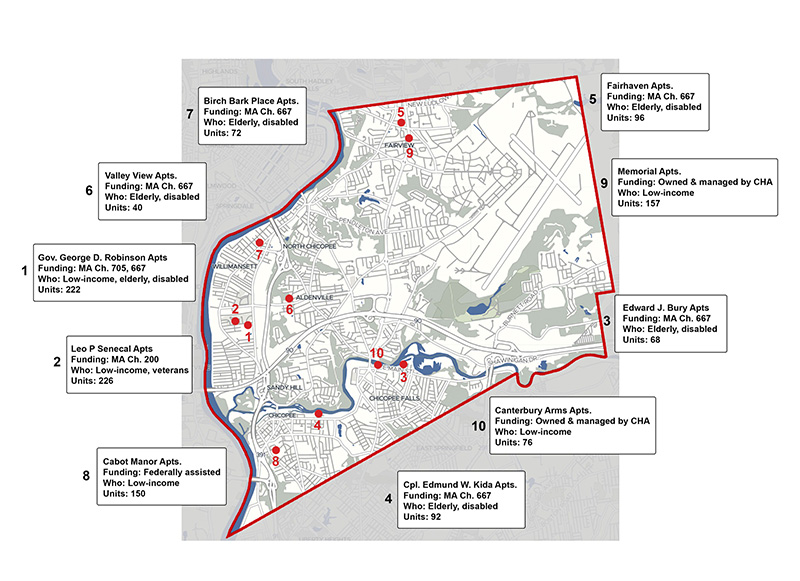Chicopee Housing Authority’s Executive Director Charged with Discrimination
| . Posted in News - 4 Comments
By Kimberly Rau, MassLandlords, Inc.
The U.S. Attorney’s Office for Massachusetts filed an amended complaint against Monica Blazic, executive director of the Chicopee Housing Authority (CHA), in December 2021, alleging that she discriminated against disabled, Black and Hispanic tenants.

Monica Blazic, shown here third from left in a 2015 photo with the Landfill Closure Alternatives Advisory Committee, has been accused of making racist comments and acting in a discriminatory manner in her position as the Executive Director of the Chicopee Housing Authority.
Housing discrimination allegations charge Blazic with refusing to allow people to speak Spanish in the housing office without first submitting formal paperwork, using racist terms against minority tenants and refusing disability accommodations, among others.
April 2021: Alleged Discrimination Based on Disability
This complaint is an amendment to one filed by the attorney’s office in April 2021, which alleged that Blazic violated the Fair Housing Act by not accommodating a tenant’s disability when she could have done so. In that complaint, Blazic is accused of refusing to let an existing tenant, Clover King, transfer to a first-floor unit in her housing complex so that she could have dialysis procedures done at home.
According to the complaint, King was approved for a transfer in 2017 and placed on a waitlist, but never received a suitable new unit. This is despite the fact that during the tenant’s time on the waitlist, “CHA offered at least 10 leases for one-bedroom, wheelchair-accessible apartments to new move-in applicants, eight of whom did not submit initial applications until several months after Ms. King was approved for transfer.”
December 2021: Alleged Repeat Instances of Discrimination Based on Race and National Origin
The amended complaint, linked above, states that Blazic preferred white tenants over those of other races and “made discriminatory statements about and to Black and Hispanic tenants, including the use of racial slurs.” It alleges coercion and intimidation toward tenants based on their race or national origin.
“Since at least 2013, Blazic has made statements with respect to the rental of CHA dwellings demonstrating that she prefers White tenants to Black and Hispanic tenants,” the amended complaint states. The examples provided are egregious.
Statements allegedly attributed to Blazic include a 2014 remark against Black people that “those [racial slur] are going to bring their gang members in,” and in 2015, “the Spanish have sex like rabbits.” She has allegedly referred to Hispanic tenants by derogatory terms, and has refused to let tenants speak Spanish in the CHA office without filling out a form beforehand, even when an employee was present who could speak Spanish.
“In yet another example, a Hispanic woman applied to live at CHA and had been on the waiting list for years,” the complaint states. “She met with Blazic twice to come off the waiting list. In these meetings, Blazic consistently referred to her as ‘you people,’ which the woman understood to be because she is Hispanic. She eventually withdrew her application to live at CHA because of how Blazic treated her.”
The CHA and Blazic are denying any wrongdoing.
“The Chicopee Housing Authority and Monica Blazic deny the allegations in the strongest possible terms and we plan to vigorously defend it in court,” defense attorney Melina Garland told Masslive.com after the amended complaint was filed.

The Chicopee Housing Authority oversees 10 properties in the city, with a total of more than 800 housing units. Many of these are state or federally funded, and serve low-income, disabled, elderly and veteran populations.
What is the Chicopee Housing Authority?
The CHA has hundreds of housing units in 10 separate complexes spread throughout Chicopee, many of which are funded with state and federal dollars. Two are owned outright and managed by the CHA. One is funded through Chapter 200, one of Massachusetts’ family low-income housing programs, and offers preference for veterans.
Multiple other complexes are funded through Chapter 705 and Chapter 667, both state-funded programs. Chapter 705 assists low-income families, and Chapter 667 helps the elderly and disabled. One complex, Cabot Manor, is federally funded.
Our infographic shows the approximate location of these apartments, as well as how they are funded and who they assist.
A Repeated Pattern of Behavior
This is not the first time that the CHA, and Blazic, have been called out for inappropriate behavior or actions related to housing discrimination.
The State of Massachusetts published an official audit report in January 2009 that examined certain CHA activities from July 1, 2005, to Sept. 30, 2007. This was when James Lynch was still the executive director of the CHA.
Among other things, the report found numerous sanitary code violations in multiple CHA housing complexes, drastically slow turnaround time for repairs and out-of-date service contracts. It also discovered a potential conflict of interest between Lynch and the Chicopee Savings Bank (CSB), which is where the CHA held its money market accounts, corporate checking accounts and certificates of deposit. Lynch was on the board of the CSB, and, during 2006, received compensation for his services, including cash payments exceeding $19,000 and more than 4,000 shares of CSB stock.
“The former executive director did not disclose his financial relationship with CSB to the Authority’s Board of Directors as required by the state’s Conflict-of-Interest Law,” the audit report stated. “In addition, the former Executive Director neither sought nor received a written opinion from the State Ethics Commission regarding this dual role.”
The state auditor reportedly referred the matter to the State Ethics Commission, but as Lynch had already retired when the report was published, no further recommendation was made in the audit.
Lynch retired as executive director in 2008, and Blazic was appointed to the role at a starting salary of $82,190. The Department of Housing and Urban Development (HUD) pays Blazic’s salary, which was $151,475 in 2018, the most current year data is available.
In December 2020, Community Legal Aid published a brief reporting that it resolved three discrimination complaints brought against the CHA and Blazic. One complaint alleged that the CHA told a blind resident who needed a service animal that he could only have a guide dog who weighed less than 30 pounds. The second complaint stated that the CHA reportedly refused to replace a lost laundry card for a hospitalized tenant, who could not use the laundry facilities without one. The third allegation said that “an applicant family with disabilities was denied an emergency waiting list placement for failing to comply with requirements that were not imposed on applicants without disabilities.”
Solutions for those complaints included monetary compensation for the affected individuals, a restructuring of the way the CHA handles disability accommodation requests, and anti-discrimination training for the staff, including Blazic.
“The fourth complaint, which is not yet resolved, alleges discrimination on the grounds of disability, race, and national origin,” read the brief from Community Legal Aid.
As of this writing, Blazic remains listed as the executive director of the CHA. MassLandlords reached out to the Chicopee mayor’s office, asking if Blazic’s HUD-funded position was under the purview of the city. It was puzzling why she had not been placed on administrative leave (paid or otherwise) pending the results of the investigation, if the city had any authority over her employment. The office had not replied by the time this story went to press.
Your Tax Dollars at Work?
Pinpointing acts of racism or discrimination, even unintentional ones, can be difficult. The state has an obligation to affirmatively further fair housing. In other words, it must be proactive in preventing discrimination. MassLandlords has brought a lawsuit against the state of Massachusetts for not providing demographic data surrounding eviction relief funding. Without that data, it’s impossible to know whether the issues tenants had securing emergency relief to avoid eviction disproportionally impacted minorities.
Other times, a racist or discriminatory action or allegation makes itself as plain as day.
What’s surprising to us is that in light of these serious, and blatant, allegations, Blazic is still in her position as executive director, working with the same populations she has reportedly said and done horrific things to. As of 2020, Hispanic people make up almost a quarter of Chicopee’s population. It’s alarming to think some of them may need the services of the Chicopee Housing Authority and encounter these conditions. We don’t know what the ethnic makeup of the CHA staff is, nor whether anyone on the staff is disabled. But it’s safe to say whoever is running the show should be compassionate and ethical toward all the populations their organization represents, regardless of whether they affiliate with them.




